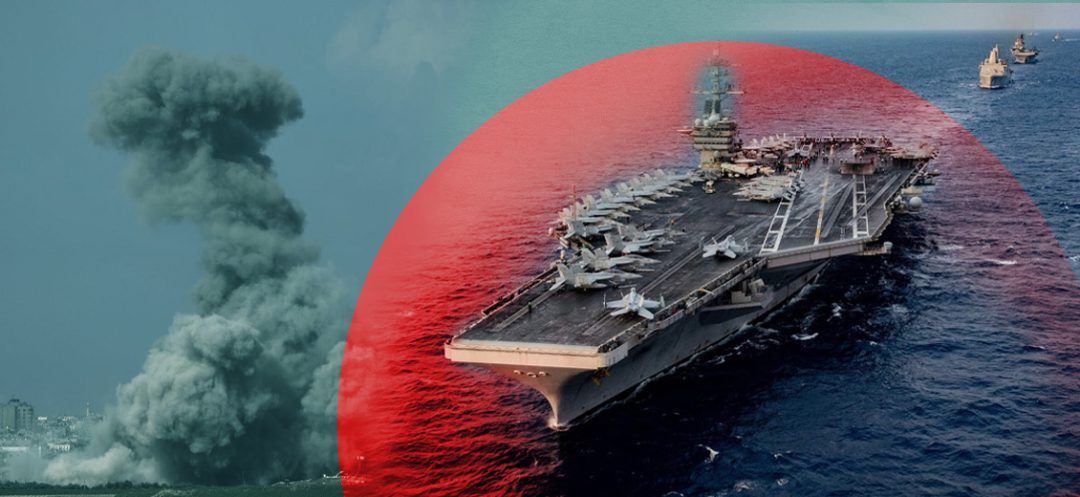- Home
- War in the Middle East
- Aircraft Carrier Roosevelt's Departure: A US Signal Against War

Washington has announced the withdrawal of aircraft carrier Theodore Roosevelt from the region, an indication that it is firmly opposed to an expansion of the war between Israel and Hezbollah. Since the outbreak of the Gaza war, Hamas and Israel have both rejected President Joe Biden's ceasefire proposal, designed to prevent the conflict from spreading to Lebanon and the wider region. Despite multiple revisions based on feedback from both sides, the proposal was not adopted. Consequently, the United States administration directed envoy Amos Hochstein to deliver a stern warning to Israel, prohibiting Netanyahu from exploiting Washington’s focus on the upcoming presidential elections as a pretext to launch a war against Lebanon, especially since Netanyahu faces political constraints.
The American message was accompanied by French diplomatic efforts through the Quintet (comprising the US, France, Saudi Arabia, Egypt and Qatar), which focused on several key goals: “preventing war against Lebanon, separating Lebanon’s presidential election from the Gaza dossier, establishing a ceasefire in the south, enforcing Resolution 1701, and revitalizing the political process to elect a president and form a government.”
According to European sources, the Quintet is working to capitalize on the recent common ground among Lebanese political factions, as well as the alignment between the initiatives of the Moderation Bloc, the opposition and Parliament Speaker Nabih Berri.
Furthermore, the Quintet interprets Amal and Hezbollah’s insistence on Berri’s initiative “Dialogue first, then Elections” and Sleiman Frangieh as a candidate, as a strategy to maintain their control over the current electoral process. Hezbollah is concerned that a sovereigntist president, who aligns with the Quintet's criteria, could advance Western agendas, including demands for the party to disarm and fully engage in political activities.
Simultaneously, Israel has embarked on the second phase of its military strategy, announcing the redeployment of its forces to the northern front with Lebanon and concentrating firepower there to “change the situation and rid the region of Iranian influence.” This phase includes implementing Resolution 1701 following the renewal of UNIFIL forces' mandate, working with the Lebanese Army to clear the area covered by the resolution of any armed groups or weapons, under both United Nations and Lebanese military supervision. This aims to remove Hezbollah's presence and influence in the south, eliminate its threats to settlements and enable Israel to begin repatriating its settlers.
According to certain information, Israel’s plan entails “destroying precision missile and drone factories along with weapons depots in Syria, to block the transfer of Iranian arms stored there to Lebanon.” The strategy also includes a military operation to isolate the south, dismantle Hezbollah’s fortified positions and target its leaders.
Within this framework, US officials revealed “that Israel carried out a commando operation in Syria, specifically beneath the mountains of Masyaf, where it destroyed a Hezbollah-operated precision missile manufacturing facility.” According to sources, “an elite Israeli unit carried out the attack, leveling an underground plant where Iran had been producing precision-guided missiles.” Moreover, “this strike is seen as a major setback to Iran and Hezbollah's efforts to produce medium-range precision missiles on Syrian soil.”
On the other hand, the London-based Human Rights Observatory reported “that Israel carried out a landing operation in Syria, leading to a confrontation with site guards, including Syrians, members of the Iranian Islamic Revolutionary Guard Corps and Hezbollah fighters. The operation resulted in the capture of two Iranian operatives, the seizure of documents and files from the destroyed facility and the death of 25 people.”
A Western diplomat confirmed that “despite assurances that Israel will not risk launching a war against Lebanon due to fears of US ‘backlash’ for crossing American red lines and directives,” the region would remain subject to heightened tensions and strict monitoring under rules of engagement, to prevent any escalation.
Will the Quintet's efforts succeed this time? Can French envoy Jean-Yves Le Drian and US envoy Hochstein generate the momentum needed to resolve the Lebanese presidential stalemate? And will Iran agree to expedite a solution in Lebanon to preemptively shape the situation before a potential Trump administration takes office?
Answers from diplomatic sources suggest that Lebanon's only solution hinges on an Iranian-American deal that “releases” Hezbollah, allowing it to agree to elect a president in line with constitutional procedures and without any preconditions.
Read more



Comments